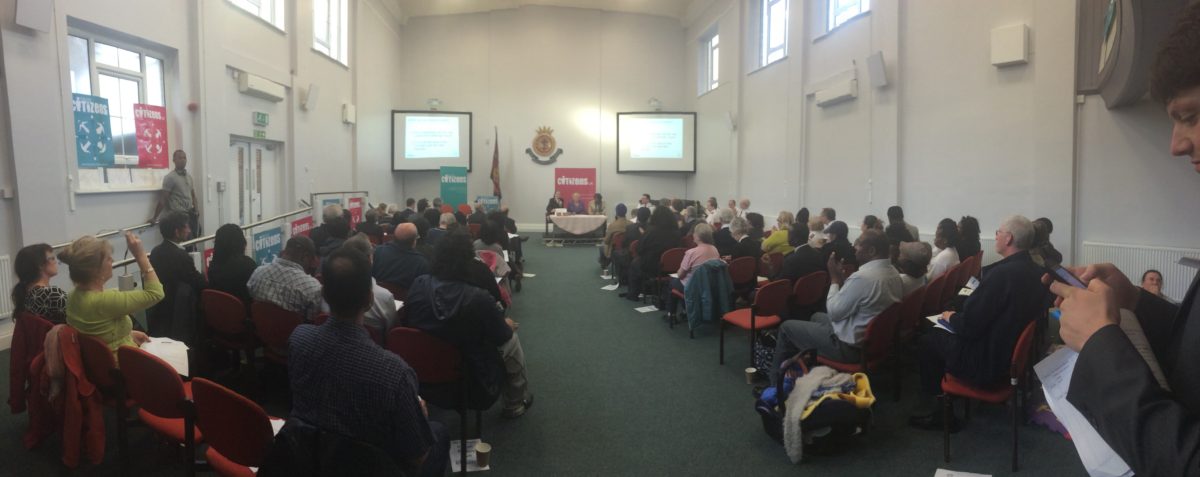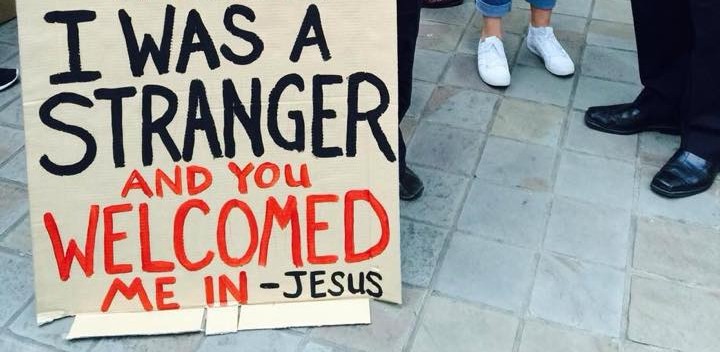Major Jonny Smith hosts a conversation on Facebook Live on 7 May 2020 with three Salvation Army corps leaders – Captain John Clifton (Ilford), Major Estelle Blake (Oldham Fitton Hill) and Major Nick Coke (Raynes Park). They explore themes related to mission, justice, community organising and the local church through stories of hope and transformation.
Category: Power
Five Ways to Live Post-Brexit
by Nick Coke and John Clifton
Let’s get a few things straight from the outset.
One of us voted in, the other out. Neither of us are racist, nor are we members of a sneering elite. We’re not interested in blame, counter-blame or accusation. We agree on this: neither remaining in nor leaving the EU is the answer to all the questions that the people of the UK are asking.
We both live in London although we’re not from London. One of us grew up in the post-industrial north of England, the other in various countries around the world. We have both spent years investing in people at all levels of society because that’s what Salvation Army officers are called to do. We both love Jesus and try to follow him. We both love politics and get involved where we are.
Whilst we voted differently we share a vision of what’s next in a post-Brexit Britain. It is not theory. We know it works because we’ve done it, experienced it, seen people empowered by it, tasted God’s kingdom in it and seen communities changed by it. We describe it here as a picture of hope.
And, of course, hope is an action.
Give, Teach, Train: how one Salvation Army Corps is organising for justice
This article first appeared in Explore Magazine 2016 and is published with permission.
A famous proverb says:
‘Give a man a fish and he’ll eat for a day. Teach a man to fish and he’ll eat for a lifetime.’
Recently, we’ve added a third part:
‘Train a man to organise and his community will feast for ever.’
However, in our part of London, the problem isn’t about having fish to eat – it’s about having a home to live in. Soon after Naomi and I arrived at Ilford Salvation Army, I met a man called Mustafa who had been an accountant. When I met him he had been on the street for a couple of days and came to us for help. What followed was a crash course in navigating bureaucracies. I met Mustafa at around 10 am. It was around 11 pm when I had to say to him: ‘I’m sorry, Mustafa. Here’s a sleeping bag. Come back in the morning.’
I had never felt so powerless in my life.
Power – which in community organising is defined as the ability to act – is the fundamental component of bringing about any sort of change you want to see. We could only make as much change as we had the power to compel.
Give a man a fish – Give a man a bed
People often come to Ilford Salvation Army because we are immediately next door to the council’s Housing Advice Centre. They come to us if they haven’t got the answer they wanted. Too often we can just give someone a sleeping bag and make a referral to set them on the path to finding appropriate support, as with Mustafa. After meeting him, however, in November 2011, we discovered a group of other Christians looking to establish a winter night shelter, following the deaths of two rough sleepers the previous year. Somewhere was needed to host the shelter, and with a large upstairs hall used only for storage, we offered our building as a venue.
Within weeks, 25 men and women were sleeping in sleeping bags on foam mats in our upstairs hall. Soup was served each evening and donations of clothing given out. It was basic, but it kept people alive. Over four winters, over 300 people have stayed at the night shelter. Each guest can tell their own story of the chain of events that led them to sleeping rough on the streets.
The shelter is only possible because of the commitment of over 150 volunteers from a wide range of backgrounds. Salvationists are joined by members of other churches: Catholics, Baptists, Pentecostals, Methodists and non- denominational. We are joined by people of other faiths and none. The current volunteer team includes Muslims, Sikhs, Jews, atheists and agnostics. We are a diverse community brought together to meet a common need. I’ve experienced more meaningful unity of the Body of Christ at the night shelter than I have in any other ecumenical setting.
Teach a man to fish – Help him find a home
A couple of years into the life of the night shelter, we realised that we shouldn’t just be giving people food and a bed. Lifesaving though this was, the night shelter needed to be a base for people to get their lives back on track and move on to a home of their own. We began convening a meeting between different local organisations to discuss what options there were for each person.
Unfortunately not everyone can move on. Last winter less than a fifth of our guests moved on to a more stable environment, whether rehab, hostel or flat. For some, their options are limited by having no recourse to public funds. For others, the obstacle is the lack of genuinely affordable housing in our borough. With the lowest stock of council housing of the London boroughs, people in Redbridge are dependent on private landlords. Rents are much higher than the local housing allowance, which means that people we have worked hard to build relationships with are moving out of the borough. This is true not just for people staying in the shelter, but also for families at our toddler group, and people who consider The Salvation Army their church. Suddenly, we all became aware that the housing crisis isn’t affecting just a niche group of homeless people. It is affecting our families and our friends. It is ripping the heart out of our community.
Train a man to organise – Building a community
Ilford Corps is a member institution of Redbridge Citizens, the local chapter of community organising alliance Citizens UK. Citizens UK is an alliance of over 350 schools, churches, mosques, synagogues, unions, youth groups and universities committed to social justice and the common good. Self-identifying as a ‘power organisation’, Citizens UK trains local institutions in the practice of community organising, so that with their neighbours they have the power to challenge politicians, councils and businesses. By building power, people can change their neighbourhoods, cities, and ultimately the country for the better. At Ilford Salvation Army, we realised we needed to get serious about organising if we were to make the change we wanted. The local elections of 2014 provided an opportunity to take action.
On Tuesday 6 May 2014, 93 citizens met at Ilford Salvation Army hall to hold a public negotiation with the three electoral candidates for leader of Redbridge Council. The three councillors were pressed by this diverse assembly to make commitments to pay a living wage to all care workers, create a private landlords register, explore the possibility of a Community Land Trust (CLT) in the borough, and to meet regularly with Redbridge Citizens to work together in addressing the issues raised at our assemblies.
A lot of hard work had gone into the assembly: negotiations with politicians; a script carefully crafted; conversation convincing members to turn up. This was just the beginning. We didn’t ask the politicians to do something for us; we asked them to do something with us. Months later, a small delegation met the newly elected Leader and Deputy Leader of the Council to follow up on their commitments, including exploring developing a community land trust (CLT).
A CLT is a way to develop genuinely affordable housing by taking the land into the shared ownership of the community. This removes the inflationary considerations of the land value from the cost of rent or purchase, meaning they can instead be linked to the median income of a given area. Stepney Salvation Army, through Citizens UK, had already been involved in pioneering the first urban CLT in the UK, and we believe that developing one within our borough will benefit local people struggling to find affordable places to live.
After months of public actions, we engaged with the borough’s Fairness Commission and succeeded in getting them to recommend that two parcels of land be allocated towards large-scale CLTs. In November 2015, we went to a council meeting at the town hall. We filled the public gallery with 80 of our members and stood together to table a question to seek the Leader of the Council’s endorsement of the CLT. He committed to attending another assembly in February 2016 where we would celebrate signing up 300 new shareholders of the CLT – the #Pound4Power campaign. The night shelter guests have all signed up as shareholders, and one of the guests at the night shelter has signed up nearly 60 new shareholders on her own!
Conclusion
Matthew 25:34-36 says: ‘Come, you that are blessed by my Father, inherit the kingdom prepared for you from the foundation of the world; for I was hungry and you gave me food, I was thirsty and you gave me something to drink, I was a stranger and you welcomed me, I was naked and you gave me clothing, I was sick and you took care of me, I was in prison and you visited me’ (NRSV)
A key aspect of these verses is that the situation is transformed. For example, the one who is hungry is fed. In other words, the homeless person gets a home – not homeless any more! What if we go a step further and recognise that one of the roots of each of these situations is the incapacity to act? Perhaps it’s also appropriate to say, ‘I had no power, but you trained me how to take it back’, so that there’s a fighting chance in that struggle ‘against the rulers, against the authorities, against the powers of this dark world and against the spiritual forces of evil in the heavenly realms’ (Ephesians 6:12 NIV).
My dream for Ilford Salvation Army is that it will not just be a community where lives are saved (though it is), where a community comes together to meet a common need (though it is) and where those sleeping rough come to realise that they are valued and loved by our community (though, again, it is) – but that it will be a place where people find the capacity to act – that power might be built.
Continue reading “Give, Teach, Train: how one Salvation Army Corps is organising for justice”
Just Life
This article first appeared in the Salvationist magazine and is published with permission.
By Nick Coke
I hear the same question all the time. Essentially it’s this: I know we should fight for social justice, but how do we actually do it?
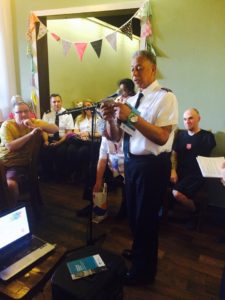 In terms of theological, devotional and motivational material urging us forward in the fight we have never had it so good. The biblical mandate for action is being preached with new fervour in the light of austerity, political upheaval and the refugee crisis. Resources are plentiful – campaign material regularly finds its way into our letterbox, email inbox and social media feeds. Dutifully we follow the instructions to pray, fundraise, get informed and click on the link to another petition website. Online activity in the cause of social change has led to the coining of a new word – ‘clicktivism’. Apparently we’re clicking like we’ve never clicked before. Yet beneath it all comes that nagging question – is any of this really making a difference? It all feels so detached. There’s surely more to justice-seeking than this.
In terms of theological, devotional and motivational material urging us forward in the fight we have never had it so good. The biblical mandate for action is being preached with new fervour in the light of austerity, political upheaval and the refugee crisis. Resources are plentiful – campaign material regularly finds its way into our letterbox, email inbox and social media feeds. Dutifully we follow the instructions to pray, fundraise, get informed and click on the link to another petition website. Online activity in the cause of social change has led to the coining of a new word – ‘clicktivism’. Apparently we’re clicking like we’ve never clicked before. Yet beneath it all comes that nagging question – is any of this really making a difference? It all feels so detached. There’s surely more to justice-seeking than this.
Ten years ago those nagging doubts started my journey towards a more active justice-seeking faith. What follows are four lessons I have learnt along the way. I share them with the hope they might provoke and encourage you a little.
LIVING A JUST LIFE
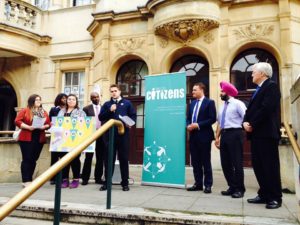 The beginning of justice-seeking is neither an action nor a programme. As an officer once reminded me: ‘We don’t do social justice – we live justly.’ In Salvation Army theology it springs from our holiness teaching, where the inner life of a believer, orientated around a relationship with God, spills over into public life. Faith may be personal but it’s never private. The inner working of our hearts is manifested in hundreds of actions and decisions we make every day. Living a just life begins with how we treat others, who we include, how we use our wealth and time. This applies to those closest to us, neighbours and work colleagues, our corps family and, by extension, the whole of humanity. The rather wonderful truth I’ve discovered is that the more I’ve chased personal holiness the more compelled I’ve been to seek a just world and the more justice-seeking I’ve engaged with the more convicted I’ve been about personal transformation.
The beginning of justice-seeking is neither an action nor a programme. As an officer once reminded me: ‘We don’t do social justice – we live justly.’ In Salvation Army theology it springs from our holiness teaching, where the inner life of a believer, orientated around a relationship with God, spills over into public life. Faith may be personal but it’s never private. The inner working of our hearts is manifested in hundreds of actions and decisions we make every day. Living a just life begins with how we treat others, who we include, how we use our wealth and time. This applies to those closest to us, neighbours and work colleagues, our corps family and, by extension, the whole of humanity. The rather wonderful truth I’ve discovered is that the more I’ve chased personal holiness the more compelled I’ve been to seek a just world and the more justice-seeking I’ve engaged with the more convicted I’ve been about personal transformation.
MOVING TO THE EDGES
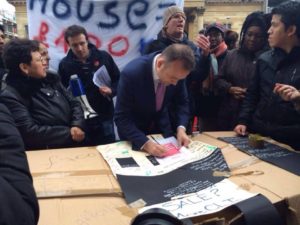 While justice begins with God, it clearly involves people. In the Exodus story the groans of the Israelite slaves rise up before God and initiate a social justice movement (Exodus 2:23–25). In today’s world we constantly hear the groans for ourselves – the low-paid worker at the food bank, the refugee, the homeless and the discriminated against. Most of us long to end such suffering. The uncomfortable truth, however, is that real justice-seeking compels us to move to the edges and experience first-hand the sufferings of others before we can act. There really is no other way. Of course when we get there we discover God is well ahead of us.
While justice begins with God, it clearly involves people. In the Exodus story the groans of the Israelite slaves rise up before God and initiate a social justice movement (Exodus 2:23–25). In today’s world we constantly hear the groans for ourselves – the low-paid worker at the food bank, the refugee, the homeless and the discriminated against. Most of us long to end such suffering. The uncomfortable truth, however, is that real justice-seeking compels us to move to the edges and experience first-hand the sufferings of others before we can act. There really is no other way. Of course when we get there we discover God is well ahead of us.
In justice-seeking circles I hear the phrase ‘being a voice for the voiceless’ over and over again. But true justice- seeking demands something more costly and sacrificial than speaking on someone’s behalf from a safe distance. Far better to stand with someone as they find a voice of their own. To sit with the homeless person who just got
evicted unfairly, to listen to the asylum seeker who was mistreated at the immigration centre, to turn up at the mosque that has just been daubed with anti-Muslim graffiti. When we personally connect with the issue then we really start to get stuck in.
FIGHTING THE GOOD FIGHT
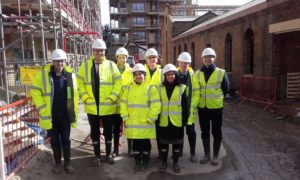 Once personally involved in the sufferings of others, it is tempting to offer charity and stop there. We meet the need, bandage the wound and move on. Most likely people will call us saints.
Once personally involved in the sufferings of others, it is tempting to offer charity and stop there. We meet the need, bandage the wound and move on. Most likely people will call us saints.
Justice-seeking, however, walks a different path as we seek to move beyond the sticking plaster to tackle the root cause. Careful analysis is required to unearth the issue, to research in detail the layers behind it and to identify those with power to change things. When working for change, moments will come when we face challenge. Earthly and spiritual powers will do their best to block our way. Disturbing the status quo or pointing out an injustice will not always make us friends. No longer will
everyone call us saints and some will consider us troublemakers. This is often where we begin to falter. We like to be popular. History, however, reminds us that justice is always, always a struggle. We must purposely and prayerfully push on.
POLITICS, BUT NOT AS YOU KNOW IT
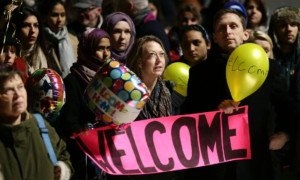 The final stage is to move from a protest voice on the margins into the corridors of power, where decisions are made. Forcing your way into this space can happen only when we organise ourselves to be powerful enough for decision-makers to take notice. This is the work of politics – not party politics – but community-based, people politics. And this is where corps and centres come into their own. After all, we know our communities and, in most cases, we have been a constant presence for generations. Almost every local expression is connecting directly with those who suffer injustice and, crucially, we are collectives who exist to transform the world! In a society where institutional
The final stage is to move from a protest voice on the margins into the corridors of power, where decisions are made. Forcing your way into this space can happen only when we organise ourselves to be powerful enough for decision-makers to take notice. This is the work of politics – not party politics – but community-based, people politics. And this is where corps and centres come into their own. After all, we know our communities and, in most cases, we have been a constant presence for generations. Almost every local expression is connecting directly with those who suffer injustice and, crucially, we are collectives who exist to transform the world! In a society where institutional
life is waning, it positions us in an extraordinary place to be justice- seekers.
When we look at our neighbourhoods we soon discover others who share our concerns for justice: faith organisations, schools, community groups. The work of building broad and powerful alliances of justice-seekers will position us around the table where we can speak truth to power and be heard.
The good news is that I hear stories of Salvationists increasingly joining in exactly this kind of grassroots justice- seeking and of powerful transformational results. My prayer is that we grasp the moment presented to us. May God bless us with his holy discomfort to live the just life.
Ce n’était pas la fin, ce n’était que le début
(Ceci est une traduction de ce billet. En tant que francophone, vous êtes peut-être peu familier avec certains concepts qui n’ont pas été expliqués dans l’autre billet. N’hésitez pas à commenter pour demander des explications ou clarifications).
Il y a quelques semaines, London Citizens a organisé une “assemblée municipale” [Mayoral Assembly] à la Copper Box, enceinte sportive construite pour les JO en 2012. Le but était de rassembler 6000 citoyens pour construire des relations positives avec les deux principaux candidats à l’élection – donc le probable futur maire – et de leur faire prendre des engagements à travailler avec nous. Les deux candidats ont accepté pas mal de nos demandes. Mais cet évènement n’était pas la fin, ce n’était que le début.
Continue reading “Ce n’était pas la fin, ce n’était que le début”
This was not the end, but just the beginning
A few weeks ago, London Citizens organised the Mayoral Assembly at the Copper Box. The aim was to gather 6000 citizens to build good relationships with the candidates, thus the possible future mayor, and to ask them to take commitment to work with us. Both candidates answered positively to several of our requests. And this event was not the end, but just the beginning.
Now that Sadiq Khan has been elected as mayor, the main challenge is to start working with him and to build good relationships, characterised by accountability. This is why London Citizens decided to welcome the new Mayor and his staff, with breakfast, on his first day to work at the London City Hall!
Continue reading “This was not the end, but just the beginning”
Pictures from the Citizens UK #MayoralAssembly last night
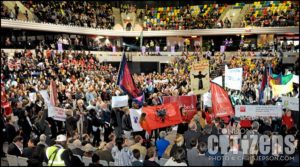 Last night saw around 6,000 people gather at the Copper Box arena in Olympic Park in Stratford for the Citizens UK London Mayoral Assembly. Front runners in the mayoral race Zac Goldsmith and Sadiq Khan were present and made encouraging commitments on housing, refugees and the Living Wage. The night also saw a fantastic presence of London Salvationists, with nearly 200 present from William Booth College and 10 London corps: Ilford, Stepney, Raynes Park, Southwark, Nunhead, Camberwell, Bromley, Wimbledon, Woodford and Mitcham. The College band played during the assembly and Captain John Clifton negotiated with Zac Goldsmith on his reaction to Citizens’ asks on Community Land Trusts. More information and reaction will be posted in the coming days, but we thought it would be good to simply share a small selection of the pictures from the assembly to remember a wonderful night: Continue reading “Pictures from the Citizens UK #MayoralAssembly last night”
Last night saw around 6,000 people gather at the Copper Box arena in Olympic Park in Stratford for the Citizens UK London Mayoral Assembly. Front runners in the mayoral race Zac Goldsmith and Sadiq Khan were present and made encouraging commitments on housing, refugees and the Living Wage. The night also saw a fantastic presence of London Salvationists, with nearly 200 present from William Booth College and 10 London corps: Ilford, Stepney, Raynes Park, Southwark, Nunhead, Camberwell, Bromley, Wimbledon, Woodford and Mitcham. The College band played during the assembly and Captain John Clifton negotiated with Zac Goldsmith on his reaction to Citizens’ asks on Community Land Trusts. More information and reaction will be posted in the coming days, but we thought it would be good to simply share a small selection of the pictures from the assembly to remember a wonderful night: Continue reading “Pictures from the Citizens UK #MayoralAssembly last night”
Top tips for Salvation Army Officers moving appointment
A matchfactory exclusive! As Salvation Army Officer appointments in the UK are made public today, we’ve consulted some battle-hardened officers, seasoned in the art of justice-seeking, to offer some top tips for the Officer who is moving appointment and wants to be ready to get going quickly. There’s some tips in there that might be relevant even if you’re not moving, and even if you’re not an Officer!
They are in no priority order – some can be done before, some when you’re there. In any case, soak up the wisdom of what they’ve got to say!
- Check out who the MP is for your new corps (and quarters in case they’re different!) at this website.
- Email the MP to arrange a one to one meeting on your arrival for the purpose of developing a public, trust-based relationship
- Same as above for local councillors
- Same as above for key reporters at the local paper
- Check whether the constituency is a marginal seat (if so, please get in touch with us as we’d love to work with you in the build-up to the next general election)
- Use this website to learn more about poverty indicators in your area
- Use this website to learn more about the ward and neighbourhood surrounding your new appointment.
- On arrival, prepare a plan for systematic visitation, including everyone connected to the Corps. Start with the leadership team – the inner circle – and work outwards. Keep an open mind and be ready to listen. And be ready to share your story too.
- Ask each person what makes them angry.
- Ask people who attend community programmes what worries them about the community.
- Ask your new neighbours who the ‘movers and shakers’ are in the neighbourhood or what 1 thing you need to know about the community as a newcomer.
- Read about the political history of your new community. Use google or local history library.
- Buy a local newspaper and highlight all the local political stories. Can you identify what issues are important to your neighbourhood? Set up a google alert for news from your new area.
- Stick to your visitation plan. Don’t get sucked into activities or programmes.
- Identify those in the congregation who are passionate about social justice.
- Walk from the quarters to the Corps for the first few weeks. Take a different route each time and make a note of other churches, faith institutions, community organisations ready to follow up at a later date.
- Read Marching Towards Justice for an introduction to community organising and The Salvation Army.
- Subscribe to www.matchfactory.org
Have you found these tips useful? Do you have any more to add? Share them in the comments below – if they’re good we’ll add them to the list!
A nightshelter to a housing campaign: I had no power but you showed me how to take it back
By John Clifton
A week on Thursday, Ilford Salvation Army will open its night shelter for the 5th consecutive winter. During this time, hundreds of people have stayed in the shelter, which accommodates 28 people per night. For those 93 nights, during the coldest part of the year, the Corps building becomes ‘home’. However, we’re very aware that sleeping on a camp-bed in our upstairs hall doesn’t constitute fullness of life. Let’s take a look at Matthew 25 again:
“Come, you that are blessed by my Father, inherit the kingdom prepared for you from the foundation of the world; 35 for I was hungry and you gave me food, I was thirsty and you gave me something to drink, I was a stranger and you welcomed me, 36 I was naked and you gave me clothing, I was sick and you took care of me, I was in prison and you visited me.”
South London Citizens Assembly at William Booth College
By Sam Tomlin

Where in our society do you see, on a frequent basis, Christians, Jews, Muslims, agnostics and atheists, young and old, people from all different social backgrounds choosing to come together to share common experiences and desires, despite all our differences? The answer is somewhere on the narrow spectrum of rarely to never. In a world which appears increasingly divided and suspicious of those who are not like ‘us’, the significance of such events should not be underestimated.
On Wednesday night, the South London chapter of Citizens UK met for its Delegates Assembly at the Salvation Army training college in Denmark Hill to do just this, albeit on a larger scale than your average monthly meeting. Nearly 250 people were packed into the main meeting hall, representing the dozens of institutions that make up South London Citizens. Four Salvation Army institutions were represented: William Booth College along with Southwark, Camberwell and Nunhead corps – and Major Mark Rose, Business Services Director of WBC, welcomed all at the start and was part of the event organising team. Continue reading “South London Citizens Assembly at William Booth College”


